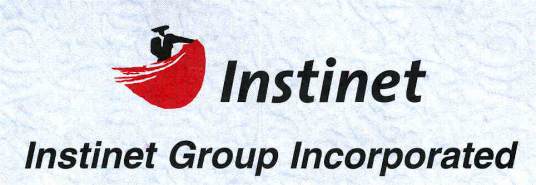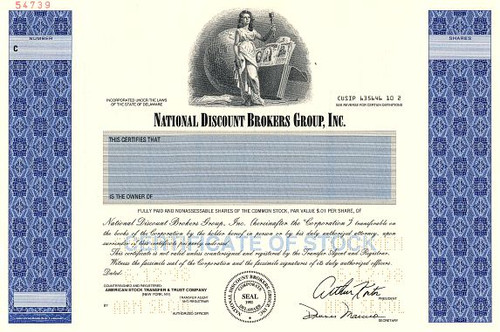Beautifully engraved certificate from the Instinet Group Incorporated. This historic document was printed by the Banknote Corporation of America and has an ornate border around it with a vignette of the company logo. This item has the printed signatures of the Company's Chief Executive Officer and Secretary. 
Certificate Vignette Instinet is an institutional, agency-only broker. As such, it executes trades for roughly 1,500 "buyside" clients such as asset management firms, hedge funds, insurance companies, mutual funds and pension funds. Headquartered in New York and with offices in 13 other cities around the world, Instinet provides sales trading services and a range of trading technologies such as the Newport EMS, algorithms, trade cost analytics, commission management, independent research and dark pools of liquidity. To many, Instinet is best known as one of the original off-exchange trading alternatives, as its "green screen" terminals were extremely prevalent in the 1980s and 1990s, and, more recently, as the founder of Chi-X Europe. Instinet was founded by Jerome M. Pustilnik and Herbert R. Behrens and was incorporated in 1967 as Institutional Networks Corp. The founders aimed to compete with the New York Stock Exchange by means of computer links between major institutions, such as banks, mutual funds, and insurance companies, with no delays or intervening specialists.[1] Through the Instinet system, which went live in December 1969, the company provided computer services and a communications network for the automated buying and selling of equity securities on an anonymous, confidential basis. Uptake of the platform was slow through the 1970s, and in 1983 Instinet turned to Bill Lupien, a former Pacific Stock Exchange specialist, to run the company. Lupien decided to market the system more aggressively to the broker community, rather than focus exclusively on the buyside as his predecessors had. As a result of Lupien's refocusing of Instinet (which the business was renamed in 1985), the firm grew rapidly in the mid-1980s. For many institutions, the Crash of 1987 demonstrated the usefulness of the electronic trading system since many brokers and market makers were unwilling to answer their phones during the freefall. Reuters, which in 1985 had acquired a portion of the firm, acquired the entire business in May 1987, though under the deal Instinet would remain an independent, New York-based subsidiary. Lupien and COO Murray Finebaum would resign shortly thereafter. Reuters would go on to IPO Instinet in 2001 keeping a 62% ownership stake. It would hold this until the 2005 acquisition of Instinet by NASDAQ in 2005, in which Nasdaq retained the INET ECN and subsequently sold the agency brokerage business to Silver Lake Partners. Under Reuters, the Instinet platform continued to grow through the late 1980s and into the early 1990s. By the time that the U.S. Securities and Exchange Commission introduced the Order Handling Rules and Regulation ATS in the late 1990s, Instinet was the dominant electronic communications network. However, these rules also gave rise to a new crop of technologically savvy competitors, some of whom employed radical new pricing schemes. By the early 2000s, these competitors, helped by Instinet missteps that included over-aggressive expansion, lavish spending and technological stagnation, had managed to significantly erode the firm's market share. As a result, Instinet in 2002 merged with the Island ECN, renaming the Island technology platform Inet. History from Wikipedia and OldCompany.com (old stock certificate research service). Overview Instinet, through affiliates, is the largest global electronic agency securities broker and has been providing investors with electronic trading solutions for more than 30 years. Instinetýs services enable buyers and sellers worldwide to trade securities directly and anonymously with each other, have the opportunity to gain price improvement for their trades and to lower their overall trading costs. Through its electronic platforms, Instinet clients can access over 40 securities markets throughout the world, including Nasdaq, the NYSE and stock exchanges in Frankfurt, Hong Kong, London, Paris, Tokyo, Toronto and Zurich. The Firm also provides customers with access to research generated by Instinet and by third parties, as well as various informational and decision-making tools. Founded in 1969, Instinet was acquired by Reuters Group PLC in 1987 and in May 2001, Instinet Group Incorporated listed on Nasdaq (symbol: INET). Throughout its history, Instinet has continually met its clients' needs by offering an innovative business model. Built on the tenets of neutrality, anonymity and transparency, Instinet does not compete with client trading strategies. The Firm acts solely as an agent for its customers and does not trade securities for its own account or maintain inventories of securities for sale. Instinet's mission is to provide services and tools that increase its clients' investment performance - meaning greater value for investors and the individuals they represent. History The growth in capital accumulation, in the breadth and depth of market liquidity, in investor confidence, indeed the history of Wall Street itself could be traced through the introduction of successive waves of technology. Each wave gave birth to new capabilities in a fundamentally simple business - the buying and selling of securities. As with other technological innovations, some adaptation has been made by market participants. In the long-term, however, technology, be it the telephone, telegraph or the computer terminal, has been an increase in the efficiency and performance of financial services businesses and the investors they represent. Instinet was founded at the cusp of several business and technological developments which have resulted in our success. First was the introduction of computer technology to the brokerage business. Initially, Instinet, then known as Institutional Networks Corporation, was designed to allow institutional money managers to trade listed stocks directly with each other. The primary goal of such trading then, as now, was a reduction in the cost of trading or transaction costs. At the same time advances in telecommunications technology (satellites, fiber optics, inexpensive bandwidth) permitted greater capacity in telecommunications processing, enabling many more "phone calls" than was previously possible. Instinet was able to incorporate this development, allowing all its clients to participate in a massive "conference call," over computers, simultaneously. Thus, to advantage its clients Instinet combined computer capacity with the flexibility of telecommunications. Instinet at once emulated the traditional point to point trading capability and expanded this capability exponentially. Beginning in the 1970's, and continuing through the 1990's, the markets experienced a sharp increase in liquidity. Much of this money was invested in mutual and pension funds managed by institutional investors. These institutions were drawn to Instinet because of its goal to reduce trading costs. As market capitalization rose, Instinet captured an increasing percentage of order flow. Global institutional investors have come to rely on technology, combined with Instinet's brokerage offerings, to seek to control their costs and risks. For many, Instinet became the first of many electronic links in increasing investment efficiency - both on the information and trading sides of the equation. In 1987, Reuters Holdings PLC acquired Instinet, shepherding in a period of deepening US infrastructure development and setting the platform for international expansion. In May 2001, Instinet presented a public offering, selling some 15% of its ownership interest. Reuters maintains an approximately 85% stake in the firm. Instinet and its affiliated companies now bring its core model of neutrality and efficiency to not only equities clients but also to plan sponsors, research and clearing clients. Instinet's reach is global and it is making strategic investments to improve capital raising and to Change The Rules of Engagement for the benefit of investors worldwide. Information provided by Company Marketing matetial.

Certificate Vignette








